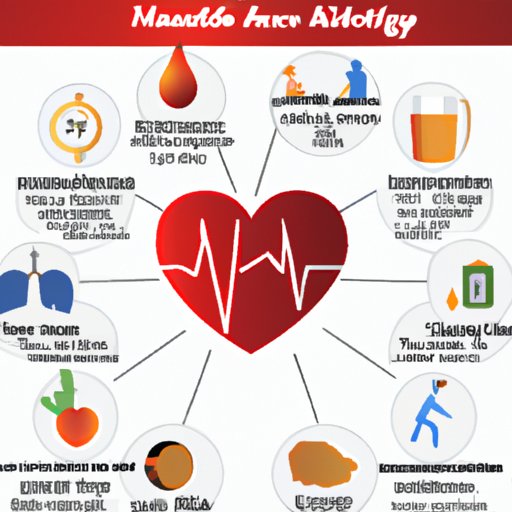Introduction
Heart disease is one of the leading causes of death in the United States. Taking steps to maintain good heart health can help you reduce your risk of developing serious conditions such as stroke and heart attack. It’s important to be aware of the signs of poor heart health and take proactive steps to monitor and improve your heart health. This article will explore how to check heart health through regular checkups, monitoring blood pressure and cholesterol levels, exercising regularly, eating a healthy diet, avoiding smoking and excessive alcohol consumption, monitoring stress levels, and maintaining a healthy weight.

Visit a Cardiologist for Regular Checkups
Regular visits to a cardiologist (a doctor who specializes in heart health) are essential for maintaining good heart health. During these checkups, your cardiologist will assess your risk factors for developing heart disease and provide guidance on how to reduce that risk. Your cardiologist may also recommend certain tests to be performed, such as an electrocardiogram (EKG) or echocardiogram (echo). These tests can help identify any potential problems with your heart.
Benefits of regular checkups include early detection of any problems with your heart, personalized advice on how to reduce your risk of developing heart disease, and peace of mind knowing that your heart is in good shape. Regular checkups can also help you keep track of any changes in your health over time.
What to expect during a checkup: During a checkup, your cardiologist will likely review your medical history, evaluate your lifestyle habits, review any medications you’re taking, and perform a physical examination. Your cardiologist may also order tests such as an EKG or echo to get a better look at your heart.
Monitor Blood Pressure and Cholesterol Levels
High blood pressure and high cholesterol levels can increase your risk of developing heart disease. Monitoring your blood pressure and cholesterol levels can help you identify any potential issues and take steps to improve your heart health.
How to measure blood pressure and cholesterol: You can easily measure your blood pressure and cholesterol levels at home using a blood pressure monitor or cholesterol testing kit. If you don’t have access to these tools, you can visit your local pharmacy and use their equipment. Your cardiologist can also measure your blood pressure and cholesterol levels during a checkup.
Tips for keeping levels in check: To keep your blood pressure and cholesterol levels in check, make sure to eat a balanced diet, exercise regularly, avoid smoking, and limit your alcohol intake. Additionally, talk to your doctor about any medications you may need to take to keep your levels in a healthy range.
Exercise Regularly
Regular exercise is essential for maintaining good heart health. Exercise helps lower blood pressure and cholesterol levels, strengthens the heart muscle, and reduces stress. The American Heart Association recommends getting at least 150 minutes of moderate-intensity aerobic activity every week.
Types of exercise recommended for heart health: Examples of moderate-intensity aerobic activity include walking, jogging, swimming, biking, and dancing. Strength training with weights is also beneficial for heart health. Aim to do strength training at least two days a week.
Tips for making exercise part of your routine: Start by setting realistic goals and breaking them down into smaller, achievable steps. Find activities that you enjoy and find ways to incorporate them into your daily life. For example, if you like walking, try taking a walk at lunchtime or after dinner. You can also join a class or group to stay motivated and accountable.
Eat a Healthy Diet
Eating a heart-healthy diet is another important step in maintaining good heart health. A heart-healthy diet should include plenty of fruits and vegetables, lean sources of protein, whole grains, and healthy fats. Avoid processed foods, sugar, and saturated and trans fats.
Foods to include in a heart-healthy diet: Examples of heart-healthy foods include fish (especially salmon, mackerel, and sardines), nuts and seeds, legumes, olive oil, avocados, and dark leafy greens. Whole grains such as oats, quinoa, brown rice, and barley are also beneficial. Choose low-fat dairy products and lean cuts of meat.
Tips for making healthy eating easier: Make meal planning and grocery shopping easier by preparing meals ahead of time and stocking your kitchen with healthy staples. Try to cook most of your meals at home and limit eating out. When dining out, choose restaurants that serve plenty of healthy options.

Avoid Smoking and Excessive Alcohol Consumption
Smoking and drinking too much alcohol can increase your risk of developing heart disease. Quitting smoking and limiting alcohol intake can help protect your heart health.
Reasons to quit smoking and cut back on alcohol: Smoking increases your risk of developing heart disease, stroke, and other serious health conditions. Too much alcohol can increase your blood pressure and contribute to obesity, which can both increase your risk of developing heart disease. Additionally, alcohol can interact with certain medications, so it’s important to talk to your doctor before drinking.
Tips for quitting smoking and limiting alcohol intake: Talk to your doctor about strategies to help you quit smoking, such as nicotine replacement therapy or prescription medications. If you choose to drink alcohol, limit yourself to one drink per day for women and two drinks per day for men. Keep track of how much you drink and avoid drinking more than the recommended amount.
Monitor Stress Levels
Stress can have a negative impact on your heart health. Prolonged stress can lead to an increased risk of developing high blood pressure, heart attack, and stroke. It’s important to monitor your stress levels and take steps to manage stress when necessary.
Signs of excessive stress: Signs of excessive stress include difficulty sleeping, feeling overwhelmed, irritability, and difficulty concentrating. If you notice any of these signs, it’s important to take a step back and find ways to reduce your stress.
Ways to manage stress: There are many different ways to manage stress, such as exercising, meditating, talking to a friend or family member, and writing in a journal. You can also try relaxation techniques such as deep breathing and progressive muscle relaxation. Additionally, make sure to get enough sleep and take breaks throughout the day.
Maintain a Healthy Weight
Being overweight or obese can increase your risk of developing heart disease. Maintaining a healthy weight is essential for protecting your heart health.
Benefits of maintaining a healthy weight: Maintaining a healthy weight can help lower your risk of developing heart disease and other chronic illnesses. Additionally, it can help improve your energy levels, confidence, and overall quality of life.
Tips for reaching and maintaining a healthy weight: One of the best ways to reach and maintain a healthy weight is to focus on eating a balanced diet and exercising regularly. Additionally, try to avoid sugary beverages, processed foods, and fast food. Talk to your doctor about any dietary changes you should make to reach your goals.
Conclusion
Taking steps to check your heart health can help you reduce your risk of developing serious conditions such as stroke and heart attack. Regular checkups, monitoring blood pressure and cholesterol levels, exercising regularly, eating a healthy diet, avoiding smoking and excessive alcohol consumption, monitoring stress levels, and maintaining a healthy weight are all important steps to take to ensure your heart health is in top shape.
(Note: Is this article not meeting your expectations? Do you have knowledge or insights to share? Unlock new opportunities and expand your reach by joining our authors team. Click Registration to join us and share your expertise with our readers.)
